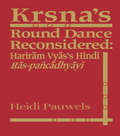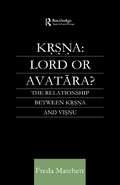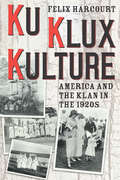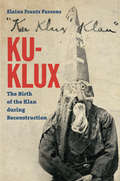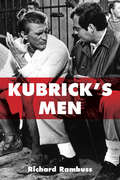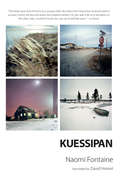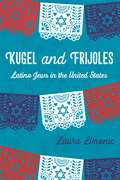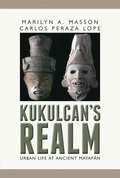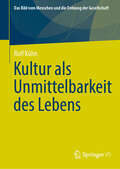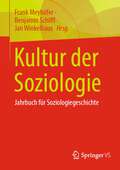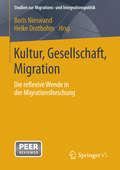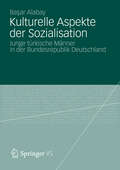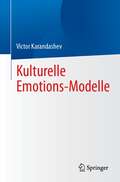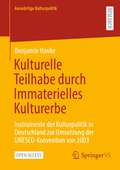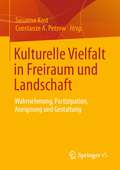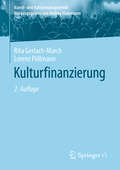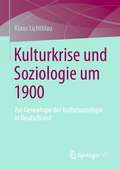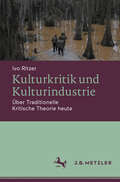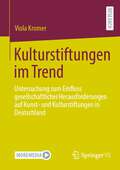- Table View
- List View
Kritik der historisch-existenzialistischen Soziologie: Ein Beitrag zur Begründung einer objektiven Soziologie (René König Schriften. Ausgabe letzter Hand #3)
by René KönigRené Königs "Beitrag zur Begründung einer objektiven Soziologie" - in einer frühen Version nach seinen Kontakten mit der Schule Emile Durkheims in Frankreich 1932/33 in Berlin entstanden, in der vorliegenden Fassung nach seiner Emigration in die Schweiz 1938 als Habilitationsschrift von der Universität Zürich angenommen und 1975 erstmals publiziert - ist in seinem, den "Radikalismus der Lebensverbundenheit in den Geisteswissenschaften, insbesondere der Soziologie" thematisierenden ersten kritischen Teil eine nachdrückliche Destruktion gesellschaftstheoretischer Positionen, welche im Anschluß an idealistische, historische oder auch lebensphilosophische und fundamentalontologische Vorstellungen "das herkömmliche Erkenntnisideal in den Wissenschaften von der geschichtlich-gesellschaftlichen Welt" zerstören und diesen eine ihnen eigene besondere Erkenntnisform zuweisen. Im zweiten konstruktiven Teil "Strukturanalyse von Emile Durkheims Wissenschaftsbegriff und die Umrisse einer Grundlegung der Soziologie" wird Soziologie als "objektive Wissenschaft" begründet sowie damit einhergehend eine einem "moralischen Rationalismus" und Humanismus verpflichtete Verbindung von Theorie und Praxis angebahnt.
Kritik – Intervention – Transformation: Feministische Widerständigkeit im hegemonialen Geschlechterdispositiv
by Jördis GrabowFeministische Bewegungen und ihre diversen widerständigen Praktiken haben in den vergangenen Jahren wieder an Sichtbarkeit gewonnen. Neben Protest- und Aktionsformen lassen sich auch zahlreiche Praktiken finden, die das Alltagsleben feministischer Akteur*innen prägen. Charakteristisch vereinen die heterogenen feministischen Widerstände Kritik-, Interventions- und Transformationspraktiken, die das hegemoniale Geschlechterdispositiv sowie realwirksame Hervorbringungen hinterfragen, angreifen und verändern. Die Autorin untersucht in ihrer explorativen Studie verschiedene Widerstandspraktiken und analysiert deren Bedeutung für gesellschaftliche Wandlungsprozesse. Bildet Geschlecht weiterhin die zentrale Bezugsdimension innerhalb feministischer Bewegungen? Wie definieren Feminist*innen die Kategorie Geschlecht und in welchem Verhältnis stehen ein theoretisches Geschlechterwissen, die feministische Praxis und das feministische Subjekt zueinander?
Kritische Analysen zur sogenannten "Clankriminalität": Phänomenologische Betrachtungen und Konstitution eines sozialen Problems
by Alexander WollingerIm gegenwärtigen Diskursfeld „Clankriminalität“ sind das Deutungsschema, die Begrifflichkeit selbst und die Behandlung des Phänomens durch Innenressorts, Strafverfolgungs- und andere Behörden umstritten. Es herrscht eine intensive Auseinandersetzung um Fragen, die sich zwischen Über- und Unterschätzung des Phänomens, zwischen selbst verursachter oder „importierter“ Kriminalität sowie zwischen Null-Toleranz-Reaktionen des Rechtsstaats einerseits und der Diskriminierung ganzer Bevölkerungsgruppen andererseits bewegen. Vereinfacht dargestellt, besteht ein Konflikt zwischen den antagonistischen Ideen „harter“ und das Phänomen negierender Deutungsschemata. Der Sammelband soll einen wissenschaftlich dominierten, differenzierten, bzw. „moderaten“ Weg einschlagen, ohne die o. g. Gegenpole zu ignorieren. Das Ziel ist die fundierte Schließung bisheriger Erkenntnislücken und die Korrektur diskursiv verbreiteter Annahmen. Das Buch adressiert ein interessiertes Fachpublikum aus den Kriminal- und Sozialwissenschaften sowie der mittleren und höheren Führungsebene der Polizei und sozialen Arbeit bzw. der Kriminalprävention.
Kritische Theorie und Kapitalismus
by Christian LudwigDer Kapitalismus in Deutschland befindet sich in einem Wandlungsprozess. Mit der Globalisierung und Öffnung neuer Wirtschaftsräume und Kapitalmärkte verbreiten sich auch unterschiedliche Krisentendenzen. Dies gilt besonders für die aktuelle politische und ökonomische Situation, die im Herbst 2008 als Finanzmarktkrise begann und inzwischen zu einer allgemeinen Wirtschaftskrise geworden ist. Christian Ludwig knüpft mit seiner theoretischen Neuorientierung an die Kritische Theorie an. Anhand einer Rekonstruktion ihrer wesentlichen Entwicklungsphasen überprüft der Autor die Bedeutung und die Plausibilität ihres Kapitalismusbegriffs. Durch die anschließende Gegenüberstellung von Kritischer Theorie und soziologischer Theorie zeigt er, welche Potenziale der Kritischen Theorie zur Weiterentwicklung der soziologischen Theorie genutzt werden können.
Krsna's Round Dance Reconsidered: Hariram Vyas's Hindi Ras-pancadhyayi
by Heidi Rika PauwelsConcerned with the process in Hinduism of reinterpreting classical texts and imbuing them with new inspiration. An example par excellence is Hariram Vyas's Ras-pancadhyayi, the earliest known Braj Bhasa version of the five chapters of Bhagavatapurana on Krsna's Dance with the Gopis.
Krsna: The Relationship Between Krsna and Visnu (Routledge Studies in Asian Religion)
by Freda MatchettThis is a study of three Sanskrit texts, the Harivamsa, the Visnupurana, and the Bhagavatabelonging to the puranic genre, the chief source of knowledge of the origins of popular Hinduism. It treats them as integrated compositions and displays the theological motives and creative skill which have gone into the making of them. It shows how all three texts contain narratives which present Krishna as one of several subordinate manifestations (avataras) of Vishnu. All three use much the same traditional material, yet each, by arranging this material in its own way, presents a distinctive view of Krishna, and the most influential of them, the Bhagavata , builds up a world view in which Krishna, not Vishnu, is supreme.
Krypto-Betrug erkennen und handeln (essentials)
by Perihan KaraçamDieses Buch bietet eine umfassende Darstellung der gängigsten Betrugsarten im Zusammenhang mit kryptobasierten Vermögenswerten und vermittelt essenzielle Kenntnisse darüber, wie Sie Krypto-Betrug erkennen und sich effektiv davor schützen können. Es fungiert als Leitfaden für jeden, der sich für Investitionen in Kryptowerte interessiert und bietet eine solide Grundlage, um das Potenzial solcher Anlagen zu erschließen, ohne Betrügern zum Opfer zu fallen.
Ku Klux Kulture: America and the Klan in the 1920s
by Felix HarcourtIn popular understanding, the Ku Klux Klan is a hateful white supremacist organization. In Ku Klux Kulture, Felix Harcourt argues that in the 1920s the self-proclaimed Invisible Empire had an even wider significance as a cultural movement. Ku Klux Kulture reveals the extent to which the KKK participated in and penetrated popular American culture, reaching far beyond its paying membership to become part of modern American society. The Klan owned radio stations, newspapers, and sports teams, and its members created popular films, pulp novels, music, and more. Harcourt shows how the Klan’s racist and nativist ideology became subsumed in sunnier popular portrayals of heroic vigilantism. In the process he challenges prevailing depictions of the 1920s, which may be best understood not as the Jazz Age or the Age of Prohibition, but as the Age of the Klan. Ku Klux Kulture gives us an unsettling glimpse into the past, arguing that the Klan did not die so much as melt into America’s prevailing culture.
Ku-Klux: The Birth of the Klan during Reconstruction
by Elaine Frantz ParsonsThe first comprehensive examination of the nineteenth-century Ku Klux Klan since the 1970s, Ku-Klux pinpoints the group's rise with startling acuity. Historians have traced the origins of the Klan to Pulaski, Tennessee, in 1866, but the details behind the group's emergence have long remained shadowy. By parsing the earliest descriptions of the Klan, Elaine Frantz Parsons reveals that it was only as reports of the Tennessee Klan's mysterious and menacing activities began circulating in northern newspapers that whites enthusiastically formed their own Klan groups throughout the South. The spread of the Klan was thus intimately connected with the politics and mass media of the North.Shedding new light on the ideas that motivated the Klan, Parsons explores Klansmen's appropriation of images and language from northern urban forms such as minstrelsy, burlesque, and business culture. While the Klan sought to retain the prewar racial order, the figure of the Ku-Klux became a joint creation of northern popular cultural entrepreneurs and southern whites seeking, perversely and violently, to modernize the South. Innovative and packed with fresh insight, Parsons' book offers the definitive account of the rise of the Ku Klux Klan during Reconstruction.
Kubrick's Men
by Richard RambussA provocative re-reading of Stanley Kubrick’s work and its focus on masculine desireThe work of Stanley Kubrick amounts to a sustained reflection on the male condition: past, present, and future. The persistent theme of his filmmaking is less violence or sex than it is the pressurized exertion of masculinity in unusual or extreme circumstances, where it may be taxed or exaggerated to various effects, tragic and comic—or metamorphosed, distorted, and even undone.The stories that Kubrick’s movies tell range from global nuclear politics to the unpredictable sexual dynamics of a marriage; from a day in the life of a New York City prizefighter preparing for a nighttime bout to the evolution of humankind. These male melodramas center on sociality and asociality. They feature male doubles, pairs, and rivals. They explore the romance of men and their machines, and men as machines. They figure intensely conflicted forms of male sexual desire. And they are also very much about male manners, style, taste, and art.Examining the formal, thematic, and theoretical affiliations between Kubrick’s three bodies of work—his photographs, his documentaries, and his feature films—Kubrick’s Men offers new vantages on to the question of gender and sexuality, including the first extended treatment of homosexuality in Kubrick’s male-oriented work.
Kuessipan
by David Homel Naomi FontaineKuessipan is an extraordinary, meditative novel about life among the Native Innu people of northeast Quebec. With the grace and perfect pitch, author Naomi Fontaine (herself an Innu) conjures up a world that reads like no other, and a community-of nomadic hunters and fishers, of mothers and children-who endure a harsh and sometimes cruel reality with quiet dignity.
Kugel and Frijoles: Latino Jews in the United States
by Laura LimonicKugel and Frijoles: Latino Jews in the United States analyzes the changing construction of race and ethnicity in the United States through the lens of contemporary Jewish immigrants from Latin America. Since Latino Jews are not easily classified within the U.S. racial and ethnic schema, their ethnic identity and group affiliation challenge existing paradigms. Author Laura Limonic offers a view into the lives of this designation of Jewish immigrants, highlighting the ways in which they adopt different identities (e.g., national, religious, or panethnic) in response to different actors and situations. Limonic begins by introducing the stories of Latino Jewish immigrants and laying out the important questions surrounding ethnic identity: How do Latino Jews identify? Can they choose their identity or is it assigned to them? How is ethnicity strategic or instrumental? These larger questions are placed within the existing scholarly literature on immigrant integration, religion, and ethnic group construction. Limonic explains how groups can be constructed when there is a lack of a perfect host group and details the ways different factors influence ethnic identity and shape membership into ethnic groups. The book concludes that group construction is never static in the United States, and, in particular, how race, religion, and class are increasingly important mediating factors in defining ethnicity and ethnic identity. As the Latino population continues to grow in the United States, so does the influence of millions of Latinos on U.S. culture, politics, economy, and social structure. Kugel and Frijoles offers new insight with which to understand the diversity of Latinos, the incorporation of contemporary Jewish immigrants, and the effect of U.S. ethno-racial structures for immigrant assimilation.
Kukulcan's Realm: Urban Life at Ancient Mayapán
by Marilyn Masson Carlos Peraza LopeKukulcan's Realm chronicles the fabric of socioeconomic relationships and religious practice that bound the Postclassic Maya city of Mayapán's urban residents together for nearly three centuries. Presenting results of ten years of household archaeology at the city, including field research and laboratory analysis, the book discusses the social, political, economic, and ideological makeup of this complex urban center. Masson and Peraza Lope's detailed overview provides evidence of a vibrant market economy that played a critical role in the city's political and economic success. They offer new perspectives from the homes of governing elites, secondary administrators, affluent artisans, and poorer members of the service industries. Household occupational specialists depended on regional trade for basic provisions that were essential to crafting industries, sustenance, and quality of life. Settlement patterns reveal intricate relationships of households with neighbors, garden plots, cultivable fields, thoroughfares, and resources. Urban planning endeavored to unite the cityscape and to integrate a pluralistic populace that derived from hometowns across the Yucatán peninsula. New data from Mayapán, the pinnacle of Postclassic Maya society, contribute to a paradigm change regarding the evolution and organization of Maya society in general and make Kukulcan's Realm a must-read for students and scholars of the ancient Maya and Mesoamerica.
Kukulkan's Realm
by Marilyn Masson Carlos Peraza LopeKukulkan's Realm chronicles the fabric of socioeconomic relationships and religious practice that bound the Postclassic Maya city of Mayapán's urban residents together for nearly three centuries. Presenting results of ten years of household archaeology at the city, including field research and laboratory analysis, the book discusses the social, political, economic, and ideological makeup of this complex urban center.Masson and Peraza Lope's detailed overview provides evidence of a vibrant market economy that played a critical role in the city's political and economic success. They offer new perspectives from the homes of governing elites, secondary administrators, affluent artisans, and poorer members of the service industries. Household occupational specialists depended on regional trade for basic provisions that were essential to crafting industries, sustenance, and quality of life. Settlement patterns reveal intricate relationships of households with neighbors, garden plots, cultivable fields, thoroughfares, and resources. Urban planning endeavored to unite the cityscape and to integrate a pluralistic populace that derived from hometowns across the Yucatán peninsula.New data from Mayapán, the pinnacle of Postclassic Maya society, contribute to a paradigm change regarding the evolution and organization of Maya society in general and make Kukulkan's Realm a must-read for students and scholars of the ancient Maya and Mesoamerica.
Kultur als Unmittelbarkeit des Lebens (Das Bild vom Menschen und die Ordnung der Gesellschaft)
by Rolf KühnBestimmt man radikal phänomenologisch die Kultur als Subjekt wie Objekt ihrer selbst, dann beinhaltet dies eine jeweils gegebene Unmittelbarkeit des Lebens als Originarität aller subjektiv kulturellen Vollzüge. Dies wird methodisch in Auseinandersetzung mit empirischen wie transzendentalen Kulturanalysen wie bei Freud, Husserl, Henry und Derrida aufgegriffen, um sich danach inhaltlichen Manifestationen der Kultur wie Religion, Wissenschaft und Ästhetik zuzuwenden. Leitend bleibt dabei für die Zukunftsbestimmung unserer Kultur eine notwendige ko-pathische Aufmerksamkeit für das Leben, welche die Singularität aller kulturellen Vollzüge über die diskursive Begrenztheit eines rein objektivierenden Verständnisses hinaus am Werk sieht. Dabei wird auch dem Imaginären wie Fiktionalen ihr unumgehbares Recht eingeräumt, wie es besonders in der Kunst als Meta-Genealogie des Individuums und der Gemeinschaftlichkeit zum Ausdruck kommt.
Kultur der Soziologie: Jahrbuch für Soziologiegeschichte
by Benjamin Schiffl Frank Meyhöfer Jan WinkelhausDie mit diesem Sonderband versammelten Beiträge schlüsseln die Kultur der Soziologie soziologiegeschichtlich auf: Im Sinne der Kultivierungspraktiken der Soziologie nehmen sie in den Blick, in welchen institutionellen Arbeits- und Gesprächszusammenhängen sich soziologische Erkenntnisprozesse vollzogen haben. Sie geben damit Einblick in das historische Gewordensein der Kultur der Soziologie, so wie sie von Soziolog*innen je im Einzelfall verstanden und praktiziert wurde und – durch Anschlüsse wie Ausschlüsse gleichermaßen – wiederum als Nach- und Weitererzählungen in das disziplinäre Gedächtnis eingeht.
Kultur, Gesellschaft, Migration.
by Boris Nieswand Heike DrotbohmDer Sammelband arbeitet den Beitrag von Reflexivität für das Verständnis der Beziehung von Kultur, Gesellschaft und Migration anhand von drei Schwerpunkten heraus: 1. Politiken kultureller Differenz 2. Transnationale Perspektiven 3. Ethnizität und Diversität. Dafür werden Autorinnen und Autoren mit unterschiedlichen disziplinären Hintergründen aus Deutschland, Österreich, der Schweiz und den USA zusammengeführt. Im Zentrum steht die Beziehung zwischen der intellektuellen Krise, welche die bisherigen Grundbegriffe der Integrations- und Migrationsforschung erfasst hat, und der Entwicklung neuer thematischer Zuschnitte, theoretischer Konzepte und Forschungsansätze.
Kulturelle Aspekte der Sozialisation
by Başar AlabayBașar Alabay untersucht die Zusammenhänge zwischen türkischer geschlechtsspezifischer Erziehung junger Männer und deren Gewaltbereitschaft und Gewaltausübung. In der türkischen und kurdischen Gesellschaft in der Türkei und in den Zuwanderungsländern in Westeuropa haben Männer bestimmte Privilegien, die jedoch mit dem Zwang verbunden sind, nach außen stets eine bestimmte Form von Männlichkeit zu wahren. Bei Jungen erfolgt um die Zeit des Schuleintritts ein Wechsel aus der weiblichen in eine männliche Sphäre - durch die Beschneidung werden sie zu einem "Mann" gemacht. Der Autor analysiert, wie der dabei empfundene Schmerz, der abrupte Übergang aus einer weiblichen in eine männliche Welt Jungen zwingen kann, Gewalt anzuwenden, um die ihnen (vermeintlich) zustehende Achtung durch Jüngere und Frauen einzufordern. Für die aktuelle Diskussion über Gewalt von Jugendlichen und jungen Männern der zugewanderten Bevölkerung liefert er somit neue Perspektiven.
Kulturelle Emotions-Modelle
by Victor KarandashevDieses Buch bietet einen multidisziplinären Überblick über kulturelle Modelle von Emotionen, mit besonderem Augenmerk darauf, wie kulturelle Parameter von Gesellschaften das Gefühlsleben von Menschen in unterschiedlichen kulturellen Kontexten beeinflussen. Es geht über die traditionelle Dichotomie des West-Ost-Vergleichs und damit verbundene Kulturparameter wie Individualismus-Kollektivismus und Machtdistanz hinaus und untersucht auch viele andere kulturelle Dimensionen, die in der Mainstream-Forschung weniger Beachtung gefunden haben.Zu den behandelten Themen gehören:· Grundlegende emotionale Prozesse in kulturellen Kontexten· Kulturelle Komplexität von Emotionen· Kulturelle Werte des Überlebens und der Selbstdarstellung· Gesichtsausdruck von Emotionen in verschiedenen KulturenCultural Models of Emotion" ist ein umfassender Überblick über die internationalen Perspektiven der kulturübergreifenden Erforschung von Emotionen und eine nützliche Quelle für Forscher in den Bereichen Anthropologie, Soziologie, Psychologie und Kommunikationswissenschaften.
Kulturelle Teilhabe durch Immaterielles Kulturerbe: Instrumente der Kulturpolitik in Deutschland zur Umsetzung der UNESCO-Konvention von 2003 (Auswärtige Kulturpolitik)
by Benjamin HankeDieses Open-Access-Buch gibt einen umfassenden Überblick über die Verfahren und Abläufe der nationalen Umsetzung der UNESCO-Konvention zur Erhaltung des immateriellen Kulturerbes in Deutschland. Die Untersuchung konzentriert sich auf die Jahre unmittelbar vor und nach dem deutschen Beitritt zum Übereinkommen im Jahre 2013. Durch eine Politikfeldanalyse wird insbesondere der Frage nachgegangen, ob und wie die neue Aufgabe vom übergreifenden Ziel des Politikfelds, kulturelle Teilhabe zu steigern, beeinflusst wurde. Die Kombination aus einer Insiderperspektive des Autors mit einem analytischen Forschungsansatz dürfte für Vertreterinnen und Vertreter der Praxis des deutschen Mehrebenensystems der Kulturpolitik ebenso interessant sein wie für andere Forschende im Feld.
Kulturelle Vielfalt in Freiraum und Landschaft: Wahrnehmung, Partizipation, Aneignung und Gestaltung
by Susanne Kost Constanze A. PetrowKulturelle Vielfalt in Freiraum und Landschaft in ihrer Komplexität zu erfassen bedeutet, Räume von unterschiedlichen sozialen Gruppen und Milieus, von Werten, Praktiken und Lebensweisen her zu denken. Freiräume und Landschaften werden dabei ebenso als Schauplatz wie Produkt sozialen Handelns verstanden. Zugleich werden die kulturellen Ordnungen des Raumes und die damit verbundenen Machtverhältnisse hinterfragt.In Städten und Metropolregionen haben die Globalisierungsprozesse und Migrationsbewegungen der vergangenen Jahrzehnte zu einer neuen kulturellen Vielfalt geführt. Menschen unterschiedlicher Sozialisation nutzen öffentliche Freiräume gemeinsam, aber nicht immer auf die gleiche Weise. In Praktiken, Artefakten, Diskursen und Subjektivierungen werden Kultur und somit Raum- und Identitätskonstruktionen sichtbar.An der Schnittstelle zwischen Theorie und Praxis widmen sich die Autorinnen und Autoren dieses Bandes unterschiedlichen Dimensionen von Vielfalt in Stadt und Landschaft. Aus der Planung kommend fragen sie sowohl nach Aspekten der Wahrnehmung, Nutzung, Aneignung und Gestaltung von städtischen Freiräumen und Kulturlandschaften als auch nach den Chancen, Herausforderungen und Konflikten, die aus der kulturellen Vielfalt für die Freiraum- und Landschaftsplanung erwachsen.
Kulturfinanzierung (Kunst- und Kulturmanagement)
by Lorenz Pöllmann Rita Gerlach-MarchDieses Lehrbuch stellt Finanzierungsformen für Kulturbetriebe vor, ohne die Bereiche Staat, Markt und gemeinnütziger Sektor kategorisch zu trennen, da sie einander durchdringen und Kulturschaffende Grenzgänger zwischen diesen Welten sind. Nach einer theoretischen Einführung werden externe Finanzierungsquellen, öffentliche und private Mittel sowie neue Formen der „gemischten" Kulturfinanzierung beleuchtet, worauf von den Kulturinstitutionen selbst erwirtschaftete Einnahmen folgen. Sie werden jeweils kurz eingeführt und aktuell praxisorientiert illustriert. Dabei liegt das Augenmerk auf besonders innovativen Finanzierungsmodellen, und erfolgreiche Beispiele werden als „best practice" detailliert beschrieben.
Kulturkrise und Soziologie um 1900: Zur Genealogie der Kultursoziologie in Deutschland
by Klaus LichtblauDieses Buch hat die Entstehung der Kultursoziologie in Deutschland im Zeitraum von 1887 bis 1933 zum Gegenstand. Ausgehend von der um 1900 weit verbreiteten Kulturkritik im deutschen Sprachraum wird zum einen die Bedeutung der Nietzsche-Rezeption und der Auseinandersetzung mit der ästhetisch-literarischen Moderne für die frühe deutsche Soziologie aufgezeigt. Die Konfrontation mit der modernen Geschlechterfrage und der Krise der Wissenschaft sind weitere Schwerpunkte der vorliegenden Abhandlung. Ausführlich behandelt werden dabei die entsprechenden Arbeiten von Ferdinand Tönnies, Georg Simmel, Max Weber, Werner Sombart, Max Scheler und Karl Mannheim.
Kulturkritik und Kulturindustrie: Über Traditionelle Kritische Theorie heute
by Ivo RitzerEine heute mit Horkheimer ‚traditionell‘ zu nennende Kritische Theorie hatte einst betont, dass nur Theorie allein richtige Praxis in einer falschen Welt sein könne. Sie insistierte radikal auf der Autonomie des Denkens gegen jeden unvermittelten Aktivismus. Denn nur das Denken könne sich ein Moment nicht-instrumenteller Vernunft bewahren, welches es inmitten des negativen Ganzen zu verteidigen gelte. Bezeichnenderweise scheinen sich von eben diesem Impetus gerade die neu proliferierenden sogenannten ‚Critical Theories‘ der ‚Identitätspolitik‘ durch Depravation kritischen Denkens zu kulturrelativistischem Artenschutz besonders weit entfernt zu haben. Kritische Theorie aber betrieb nicht das Geschäft regressiver Aufklärungsdenunziation, sondern setzte stattdessen vielmehr auf das subversive Potential „ästhetischer Rationalität“ (Adorno). Als deren affirmativer Gegner wirkt heute eine ‚diversifizierte‘ Kulturindustrie, in der völkische Ideologie eine gegenaufklärerische Renaissance erlebt und dem postmodernen Kapitalverhältnis der ideale Rahmen seiner globalen Reproduktion geboten wird. Diese neue alte Kulturindustrie demonstriert: Kultur muss sich wandeln, damit alles so bleibt, wie es ist. Der Band eröffnet eine neue hermeneutische Perspektive auf die Arbeiten von Horkheimer, Adorno, Marcuse et al. Dabei geht es mit dem Fokus theoriebasierter Kulturkritik weder um eine historische Rekonstruktion noch um eine Detailstudie zu ausgewählten Aspekten, sondern um die Frage der Rolle von Kritischer Theorie heute insgesamt. Mithin ergibt sich für den Band neben der Darstellung zentraler Schriften von Horkheimer, Adorno und Marcuse auch der Anspruch eines eigenständigen Beitrags zur kulturkritischen Theoriebildung.
Kulturstiftungen im Trend: Untersuchung zum Einfluss gesellschaftlicher Herausforderungen auf Kunst- und Kulturstiftungen in Deutschland
by Viola KromerIn diesem Buch werden die Strukturen der Kunst- und Kulturförderung in Deutschland untersucht. Die Autorin konzentriert sich dabei auf das Phänomen des Kulturstaats, der öffentlichen Kulturförderung, der stifterischen Kulturförderung sowie der Rolle des Staats als Stifter. Mit einem Basisdatensatz von über 7.000 Kulturstiftungen wird die Grundlage für die empirische Forschung geschaffen. In der Studie wird das Verhältnis von Kunst- und Kulturstiftungen zu zukunftsrelevanten gesellschaftlichen Entwicklungen analysiert und das Potenzial, das in der Verknüpfung von Kunst und Kultur mit diesen Entwicklungen liegt, untersucht. Anhand einer Befragung unter Stiftungen und einer Auswertung von Stiftungsprojekten werden die Fragen beantwortet, ob sich Kunst- und Kulturstiftungen zukunftsrelevanten gesellschaftlichen Entwicklungen widmen möchten und ob sie dies in ihrer Praxis tatsächlich tun. Im abschließenden Kapitel werden die Ergebnisse der Arbeit zusammengefasst, Thesen formuliert und ein Ausblick auf weitere, thematisch einschlägige Forschung gegeben. Die Studie bietet somit einen umfassenden Einblick in die Rolle von Kunst- und Kulturstiftungen im Kontext gesellschaftlicher Entwicklungen und deren Potenzial für die Zukunft.




